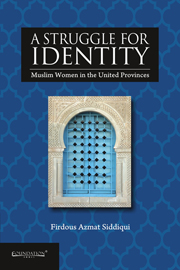Book contents
- Frontmatter
- Contents
- Acknowledgements
- Introduction
- 1 Social Stratification of Muslim Women in the United Provinces
- 2 Socio-religious Movement and the Muslim Women's Issue
- 3 British Perception of Muslim Women: Questions of Fecundity and Health
- 4 Crises in the Social and Economic Identity of Muslim Women: The Great Uprising of 1857
- 5 Changing Profile of Muslim Women through Education
- 6 Patriarchy and Social Obligation of Indian Muslim Women
- 7 Cultural Clash: From Tawaif to Kasbi
- 8 Law, Land and Muslim Women: The Economic Situation
- 9 Muslim Women's Response to the New Judicial System
- Conclusion
- Glossary
- Bibliography
- Index
3 - British Perception of Muslim Women: Questions of Fecundity and Health
Published online by Cambridge University Press: 05 October 2014
- Frontmatter
- Contents
- Acknowledgements
- Introduction
- 1 Social Stratification of Muslim Women in the United Provinces
- 2 Socio-religious Movement and the Muslim Women's Issue
- 3 British Perception of Muslim Women: Questions of Fecundity and Health
- 4 Crises in the Social and Economic Identity of Muslim Women: The Great Uprising of 1857
- 5 Changing Profile of Muslim Women through Education
- 6 Patriarchy and Social Obligation of Indian Muslim Women
- 7 Cultural Clash: From Tawaif to Kasbi
- 8 Law, Land and Muslim Women: The Economic Situation
- 9 Muslim Women's Response to the New Judicial System
- Conclusion
- Glossary
- Bibliography
- Index
Summary
The Indian Muslim faced several problems because according to the British perception, all Muslims of the world formed a monolithic category; they assumed that Indian Muslims were no different from the Muslims they had come into contact with in Europe or other Islamic countries. The connection of Indian Muslims with those in other Islamic countries can be better understood in Edward Said's concept of Orientalism:
Yet at certain moments of that general European history of interest in the East, particular part of the Orient like Egypt, Syria, and Arabia can not be discussed without also studying Europe's involvement in the more distant parts, of which Persia and India are the most important; a notable case in point is the connection between Egypt and India so far as eighteenth and nineteenth century Britain was concerned.
The British needed to provide a moral basis to their rule, and therefore projected Indian society as uncivilised and backward. Muslims, as part of that society, were placed in the same category. According to the British, their purpose was to introduce rationality in what they assumed was the irrationality inherent in Islam.
This chapter explores British remarks about and observations on Indian Muslim women, and argue how and why the British projected them in a derogatory manner in their discursive writings. The revolt of 1857 alarmed the British, making them review ways to control Indian society, and future policies to be adopted towards Muslims. This incident also served as a lesson in maintaining a distance from Indians where administration was concerned. As a result, recruitment became restricted to the upper-class service gentry of European origin. British men began arriving in large numbers with their families, followed by many unmarried women, who came for missionary work (and sometimes in search of appropriate husbands). The sudden influx of Europeans made it even more vital for the British to establish a racial hierarchy and condemn Indians as morally and racially inferior.
- Type
- Chapter
- Information
- A Struggle for IdentityMuslim Women in United Provinces, pp. 35 - 54Publisher: Foundation BooksPrint publication year: 2014



